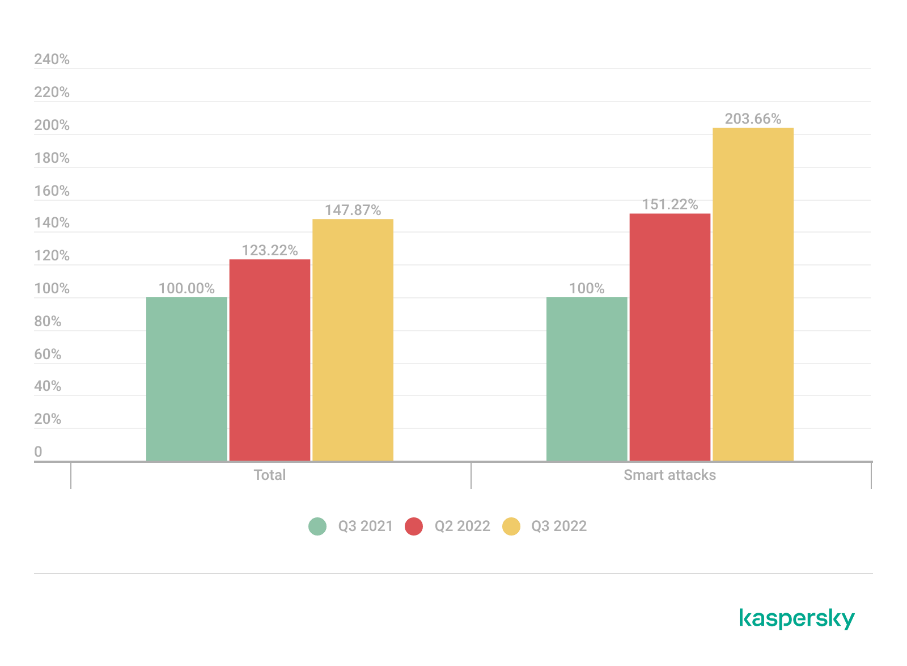Woburn, MA – November 7, 2022 – A new Kaspersky report revealed that Distributed Denial of Service (DDoS) attacks increased steadily in the third quarter of 2022, particularly those conducted by professionals. The number of sophisticated attacks doubled, compared to the same period last year, while the number of attacks by hacktivists almost vanished in the third quarter, following a notable rise in the previous two quarters. These and other findings are part of Kaspersky’s latest quarterly DDoS report.
A Distributed Denial of Service (DDoS) attack is designed to stop a website from functioning normally or disrupt it completely. During an attack (which usually targets government institutions, retail, financial, media and other organizations) the victim loses customers due to the unavailability of their website and their reputation suffers.
In Q3 2022, the number of DDoS attacks of all types rose in relation to previous reporting periods. According to Kaspersky experts, this is a standard picture: a relatively calm summer is followed by a sharp surge in DDoS activity. However, the overall number of DDoS attacks also rose by 47.87% compared to Q3 2021, while the number of smart, i.e. sophisticated and professionally conducted attacks, doubled.

A comparative number of DDoS attacks:
Q3 2022 and Q3 2021 as well as Q2 2022. Data for Q2 2021 is taken as 100%
A comparative number of DDoS attacks:
Q3 2022 and Q3 2021 as well as Q2 2022. Data for Q2 2021 is taken as 100%
What makes the third quarter more remarkable is the continuous drop in non-professional attacks. Although hacktivists were quite passionate and prolific in their DDoS attempts during the first half of 2022, in Q3 they switched to other malicious activity. By Q3, the number of hacktivist DDoS attacks was tending towards zero. Meanwhile, the number of high-quality professional attacks, after a significant increase in Q1, remained at a high level. The targets have not changed either; mainly in the financial and government sectors.
In terms of DDoS attack duration, there were no new records. While Q2 was marked by the longest attack ever observed, Q3 was calmer. On average, attacks lasted about eight hours, with the longest being just under four days. Compared to the previous quarter, this figure seems rather modest, but the figures are still immense. In Q3 of last year, the duration of DDoS attacks was measured in minutes, not hours. The situation remains challenging in this regard.
 A comparative duration of DDoS
attacks: Q3 2022 and Q3 2021 as well as Q2 2022. Data for Q2 2021 is taken as 100%
A comparative duration of DDoS
attacks: Q3 2022 and Q3 2021 as well as Q2 2022. Data for Q2 2021 is taken as 100%
"Since the end of February, we have been observing and thwarting an unusually high number of amateur hacktivist attacks,” said Alexander Gutnikov, security expert at Kaspersky. “However, the number of these kinds of attacks has been gradually declining and by the end of Q3 had returned to normal levels. During this period, we observed plenty of sophisticated attacks aimed at reaching clearly defined goals: for example, to cut media outlets off, or even suspend general operations of government organizations.”
Read more about DDoS attacks in Q3 2022 on Securelist.
To stay protected against DDoS attacks, Kaspersky’s experts recommend implementing the following measures:
· Maintain web resource operations by assigning specialists who understand how to respond to DDoS attacks.
· Validate third-party agreements and contact information, including those made with internet service providers. This helps teams quickly access agreements in case of an attack.
· Implement professional solutions to safeguard your organization against DDoS attacks. For example, Kaspersky DDoS Protection combines Kaspersky’s extensive expertise in combating cyberthreats and the company’s unique in-house solutions.
· Know your traffic. Use network and application monitoring tools to identify traffic trends and tendencies. By understanding your company's typical traffic patterns and characteristics, you can establish a baseline to more easily identify unusual activity that is symptomatic of a DDoS attack.
· Have a restrictive Plan B defensive posture ready to go. Be in a position to rapidly restore business-critical services in the face of a DDoS attack.
About Kaspersky
Kaspersky is a global cybersecurity and digital privacy company founded in 1997. Kaspersky’s deep threat intelligence and security expertise is constantly transforming into innovative security solutions and services to protect businesses, critical infrastructure, governments and consumers around the globe. The company’s comprehensive security portfolio includes leading endpoint protection and a number of specialized security solutions and services to fight sophisticated and evolving digital threats. Over 400 million users are protected by Kaspersky technologies and we help 240,000 corporate clients protect what matters most to them. Learn more at usa.kaspersky.com.
Media Contact
Sawyer Van Horn
sawyer.vanhorn@Kaspersky.com
(781) 503-1866
Hacktivists give way to professionals: DDoS attacks rise in Q3 2022
Kaspersky